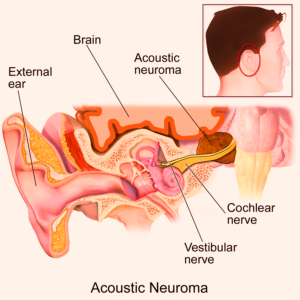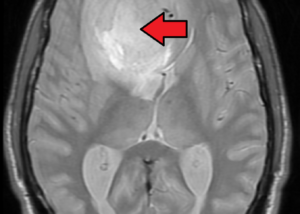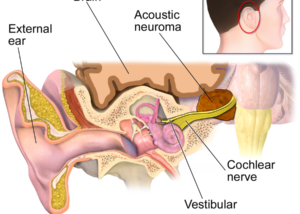There are many causes of twitching involving the face, and a type of brain tumor called an acoustic neuroma can be one of them.
But if you have an acoustic neuroma, facial twitching should not be at the top of your worries. This brain tumor can cause worse problems.
Facial Twitches Caused by Acoustic Neuroma
“This is rare but can be associated with larger acoustic neuroma,” says Ted McRackan, MD, MSCR, Director, Skull Base Center; Assistant Professor, Department of Otolaryngology – Head and Neck Surgery, Medical University of South Carolina.

Blausen.com/CreativeCommons
“The vestibular nerves, which is the nerve that these tumors typically arise from, travel from the brain to the inner ear next to the facial nerve.”
The facial nerve is one of the 12 cranial nerves.
Dr. McRackan explains, “With very large tumors, the facial nerve can be compressed. This can cause twitching and/or weakness, but again, this is rare.
“The facial twitching arises from the facial nerve. This can occur anywhere on the face and sometime in the neck.”
Another name for this brain tumor is vestibular Schwannoma (the proliferative cells come from the Schwan cells).
“Sometimes when a patient has such symptoms, the tumor may arise from the facial nerve rather than the vestibular nerves (called a facial nerve Schwannoma),” says Dr. McRackan.
Twitching in the Face
• Very rare cause: acoustic neuroma. These benign tumors overall are rare, and their more common symptoms include hearing loss and/or tinnitus in one ear, pain in the ear, balance problems, dizziness, headache, numbness or weakness in the facial muscles, eye problems and swallowing difficulties. A person may have only a few of these symptoms.
• TMJ disorder: another rare cause.
• Benign fasciculation syndrome: not rare but not common cause of facial twitching.
• Stress, not enough sleep, fatigue, too much caffeine, dehydration: common causes.
The definition of “twitch in the face” is also open to interpretation.
• There’s the type of twitching at any location of the face that’s the same kind that affects an eyelid.
• Then there’s the so-called tic type of twitch, which can be caused by Tourette’s syndrome or just an odd habit.
Usually, a twitch in the face is nothing to worry about. But if these twitches began appearing at around the same time as the symptoms of acoustic neuroma (especially if you have new-onset hearing loss or tinnitus/ringing in one ear), this is more suggestive of this benign growth.
However, according to a paper in the American Journal of Otology (May 1994), some of the symptoms of a facial nerve mass can mimic an acoustic neuroma.
The growth can occur at any point along the facial nerve. An MRI will be ordered when a doctor suspects either condition.
 In addition to acoustic neuroma, Dr. McRackan’s clinical practice focuses on comprehensive management of ear, hearing, balance and skull base disorders. Areas of interest include cochlear implants, facial nerve disorders and tumors, vertigo and endoscopic ear surgery.
In addition to acoustic neuroma, Dr. McRackan’s clinical practice focuses on comprehensive management of ear, hearing, balance and skull base disorders. Areas of interest include cochlear implants, facial nerve disorders and tumors, vertigo and endoscopic ear surgery.
 Lorra Garrick has been covering medical, fitness and cybersecurity topics for many years, having written thousands of articles for print magazines and websites, including as a ghostwriter. She’s also a former ACE-certified personal trainer.
Lorra Garrick has been covering medical, fitness and cybersecurity topics for many years, having written thousands of articles for print magazines and websites, including as a ghostwriter. She’s also a former ACE-certified personal trainer.
.










































